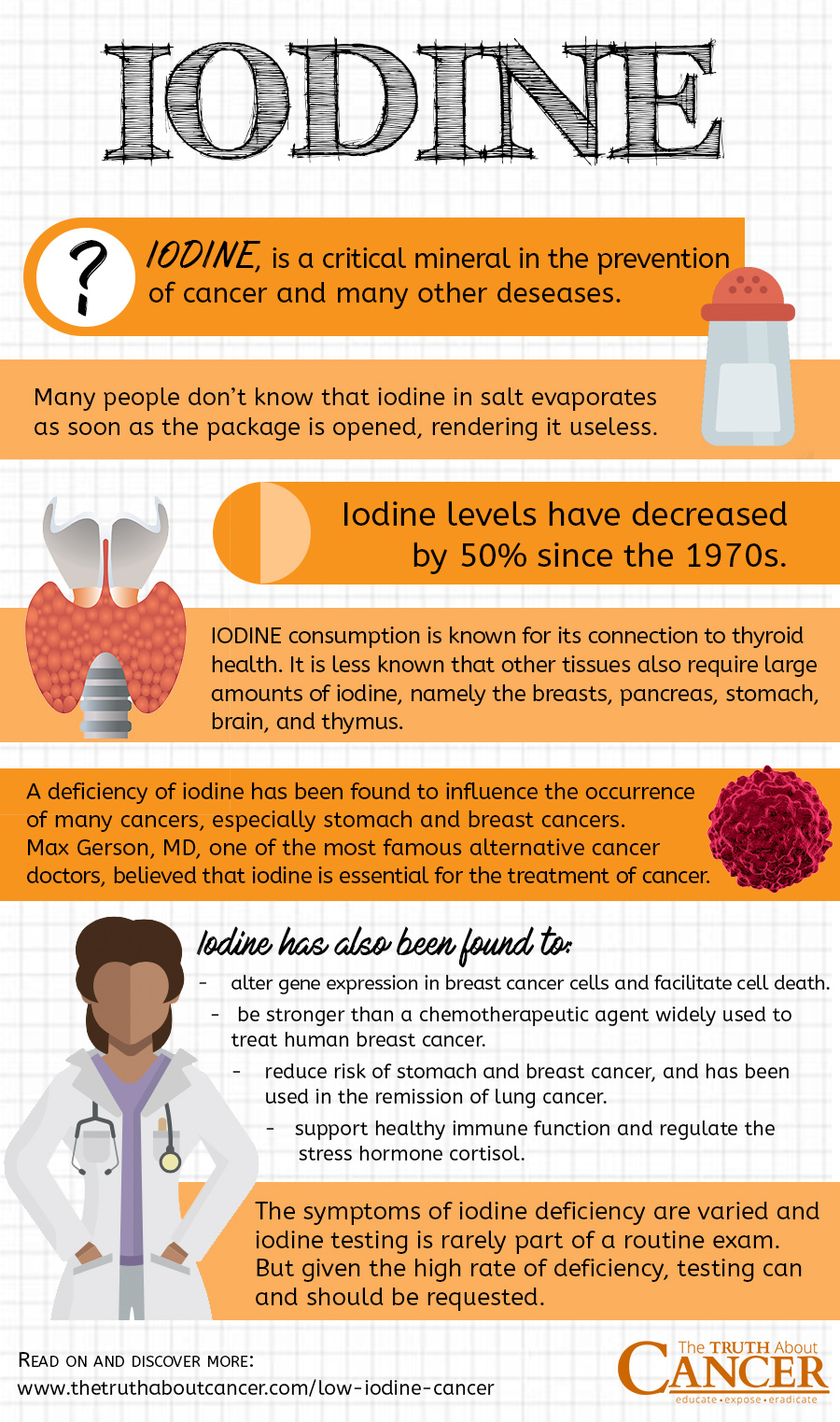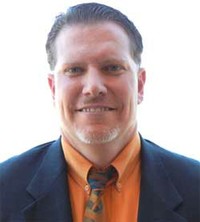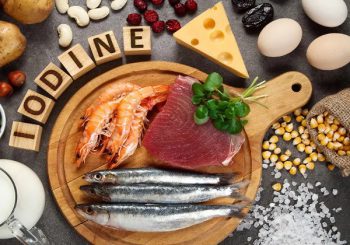Guest Writer for Wake Up World
Iodine, a critical mineral in the prevention of cancer, has been used in one form or another for centuries. First as medicine (for everything from breast cancer to syphilis) and consumed in the form of seaweed, and eventually added to bread. Then, in 1948, iodine was suddenly thought of as dangerous and was removed from medical arsenals – as well as from our food in the 1970s.
Our politicians suggested that people could get trace amounts of iodine in iodized salt, but then two things happened. First, recommendations were made to reduce sodium intake, and second, few realized that the iodine in salt evaporates under certain conditions, such as moisture, storage, and exposure to oxygen. One study showed that among samples all lost iodine over the 12-month sampling period, many as much as 100%. The rate of iodate loss was influenced by the salt’s origin and composition, the packaging material, and the relative humidity during storage.1 Plus, when iodine is added to salt, including potassium iodide, it includes an anti-caking agent, which isn’t a particularly healthy option. Unrefined salt is made from seawater and contains many more minerals than iodized table salt, but not much iodine.
Iodine consumption is known for its connection to thyroid health. But it is less known that other tissues also require large amounts of iodine, namely the breasts, pancreas, stomach, brain, and thymus.
Iodine consumption has plummeted 50% since 1970 and has corresponded with a dramatic increase in breast and prostate cancers.2 Studies show that iodine deficiency is a worldwide epidemic, often affecting women of reproductive age which could not only increase their risk of cancer, but could cause complications during pregnancy and in fetal development. Iodine is essential for a successful healthy pregnancy, and insufficient iodine leads to miscarriages, reproductive failures, abnormal brain development, and congenital hypothyroidism.3
Ironically, just as iodine was removed from our bread, the iodine-blocking element, bromine, was added to flour. Bromine chemicals were then added not only to our bread and flour, but also to mattresses (as a fire retardant), clothing, and other consumer products.
The problem was exacerbated further as pesticides and food additives were increasingly allowed to be used in our food supply — chemicals that interfere with iodine absorption. It’s no wonder that almost everyone has low iodine today.
Iodine deficiency is, to some extent, an error of politics. However, it has become even more prevalent with the ever-increasing presence of xenoestrogens (chemical estrogens found in many personal and home care products and in air pollution) that not only poison the body, but contribute to hormone imbalance and estrogen dominance.
It’s clear to see how iodine has been practically eliminated from our cancer-prevention toolkit.
Iodine Deficiency and Cancer, a Closer Look
A deficiency of iodine has been found to influence the occurrence of many cancers. In Turkey (the country), gastric cancers are most common in areas where iodine deficiency is high. Increased iodine intake over the past several years has been strongly correlated with a reduction in stomach cancers.4
Researchers have attributed the low rate of breast cancer in Japan to high dietary iodine (and selenium). Breast cancer cells need iodine to facilitate cell death and suppress tumor growth.5
In 2008, Bernard A. Eskin, MD, explained how iodine actually alters gene expression in breast cancer cells, including the function of programmed cell death. Iodine was also found to decrease estrogen-responsive genes.6 Low iodine increases circulating estrogen levels, and given that estrogen inhibits iodine absorption, this is especially problematic. Iodine deficiency also makes breasts more susceptible to carcinogenic action, promoting the growth of tumors.
Max Gerson, MD, one of the most famous alternative cancer doctors, believed that iodine is essential for the treatment of cancer.7 Michael B. Schachter, MD, says,
Iodine may be needed in individualized doses to improve thyroid function, immune function, and the optimal functioning of all the cells in the body; several associated nutrients need to be given including vitamin C, selenium, magnesium, unrefined salt, and sufficient water; these help to prevent strong detoxification reactions as a result of the release of bromine from the tissues when iodine is given in milligram quantities. These higher milligram doses rather than microgram doses help to enhance anti-cancer functions in most if not all cancers, but certainly in cancers of the thyroid, breast, ovary, and prostate.”
Iodine has also been found to:
- Alter gene expression in breast cancer cells and facilitate cell death.8
- Be stronger than a chemotherapeutic agent widely used to treat human breast cancer.9
- Reduce risk of stomach and breast cancer, and has been used in the remission of lung cancer.10
- Support healthy immune function and regulate the stress hormone cortisol.11
How to Test for Low Iodine
The symptoms of iodine deficiency are varied and iodine testing is rarely part of a routine exam. But given the high rate of deficiency, testing can and should be requested.
Here are some possible iodine testing methods:
- A random urine test ordered by a physician is a good place to start.
- The iodine patch test refers to painting a two-inch square of tincture of iodine or Lugol’s Iodine on the body and watching to see how long the orange square takes to fade. However, this test is not considered to be overly reliable or conclusive, but can help to give a general idea as to whether someone may be deficient in iodine.
- The gold standard is the 24 Hour Iodine Loading Test, which can be done with a doctor or via online testing at Hakala Labs and others.
You can get iodine from some foods, with seaweed being the highest source. However, there can be some dangers with seaweed due to contamination from polluted water or radioactivity from Fukushima. Iodine content varies in food, so be sure to work with your health practitioner to be sure you’re getting the right amount.
Kelp supplements are an option if you can get a clean source that is not contaminated. Dr. Edward Group (interviewed in the TTAC docu-series) recommends an iodine supplement called Detoxadine.

A Special Note If You Are on a Therapeutic Iodine Protocol
According to David Brownstein, MD, and other iodine researchers, those on a high-dose iodine protocol (12.5 mg – 50 mg/day) may need a daily companion dose of magnesium as high as 1200 mg, which would be best derived at least in part transdermally. Other companion nutrients (a name coined by Lynne Farrow, author of The Iodine Crisis) are selenium, vitamin C, riboflavin, niacin, and unrefined salt such as Celtic sea salt, Himalayan, and Redmonds Real Salt. These nutrients will boost absorption and help prevent side effects from the protocol such as headaches and fatigue.
If you are considering adding iodine supplementation to your personal health regimen, it is always advised to consult with a qualified health practitioner who can guide you on dosages suitable for your body, health condition, and lifestyle.
Sources and References:
- 1. Stability of iodine in iodized salt used for correction of iodine-deficiency disorders. II
- 2. Changes in Dietary Iodine Explains Increasing Incidence of Breast Cancer with Distant Involvement in Young Women
- 3. A Role for Iodide and Thyroglobulin in Modulating the Function of Human Immune Cells
- 4. Comparison of iodine contents in gastric cancer and surrounding normal tissues.
- 5. Changes in Dietary Iodine Explains Increasing Incidence of Breast Cancer with Distant Involvement in Young Women
- 6. Iodine Alters Gene Expression in the MCF7 Breast Cancer Cell Line: Evidence for an Anti-Estrogen Effect of Iodine
- 7. Gerson Therapy Handbook
- 8. The Extrathyronine Actions of Iodine as Antioxidant, Apoptotic, and Differentiation Factor in Various Tissues
- 9. J. Cancer Res. 92, 483–487, May 2001
- 10. J Natl Cancer Inst. 1993 Aug 18;85(16):1342-3
- 11. A Role for Iodide and Thyroglobulin in Modulating the Function of Human Immune Cells
- 12. Micronutrient deficiencies
- 13. Micronutrient Facts
- 14. A Role for Iodide and Thyroglobulin in Modulating the Function of Human Immune Cells
- 15. Iodine deficiency disorders
Originally published at The Truth About Cancer and reproduced here with permission.
About the author:
 Ty Bollinger is a health freedom advocate, cancer researcher, former competitive bodybuilder and author. After losing several family members to cancer, he refused to accept the notion that chemotherapy, radiation, and surgery were the most effective treatments available for cancer patients. He began a quest to learn all he possibly could about alternative cancer treatments and the medical industry. What he uncovered was shocking. There is ample evidence to support the allegation that the “war on cancer” is largely a fraud and that multinational pharmaceutical companies are “running the show.” Ty has now made it his life mission to share the most remarkable discovery he made on his quest: the vast majority of all diseases, including cancer, can be easily prevented and even cured without drugs or surgery.
Ty Bollinger is a health freedom advocate, cancer researcher, former competitive bodybuilder and author. After losing several family members to cancer, he refused to accept the notion that chemotherapy, radiation, and surgery were the most effective treatments available for cancer patients. He began a quest to learn all he possibly could about alternative cancer treatments and the medical industry. What he uncovered was shocking. There is ample evidence to support the allegation that the “war on cancer” is largely a fraud and that multinational pharmaceutical companies are “running the show.” Ty has now made it his life mission to share the most remarkable discovery he made on his quest: the vast majority of all diseases, including cancer, can be easily prevented and even cured without drugs or surgery.
For more information, visit:

If you've ever found value in our articles, we'd greatly appreciate your support by purchasing Mindful Meditation Techniques for Kids - A Practical Guide for Adults to Empower Kids with the Gift of Inner Peace and Resilience for Life.
In the spirit of mindfulness, we encourage you to choose the paperback version. Delve into its pages away from screen glare and notifications, allowing yourself to fully immerse in the transformative practices within. The physical book enriches the learning process and serves as a tangible commitment to mindfulness, easily shared among family and friends.
Over the past few years, Wake Up World has faced significant online censorship, impacting our financial ability to stay online. Instead of soliciting donations, we're exploring win-win solutions with our readers to remain financially viable. Moving into book publishing, we hope to secure ongoing funds to continue our mission. With over 8,500 articles published in the past 13 years, we are committed to keeping our content free and accessible to everyone, without resorting to a paywall.







